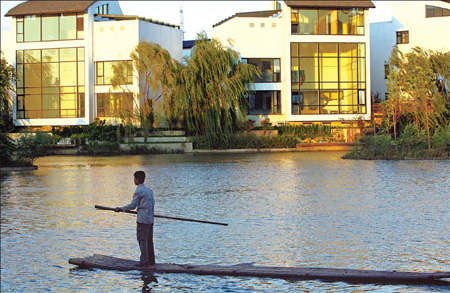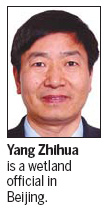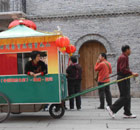Top Stories
Water views set to cost more
By Shen Jingting (China Daily)
Updated: 2010-03-10 09:19
 |
Large Medium Small |
|
 A worker rides a raft to clean the lake in a villa complex in northern Beijing.
An Dong / For China Daily |
Prices of luxury waterside residences might climb higher after they prompted the need for a tougher protection regulation for the city's wetlands which is due out next year.
The Beijing Municipal Bureau of Landscape and Forestry (BMBLF) said the new regulation might ban real estate projects inside wetland reserves and restrict the construction of property projects near wetland parks.
"There will be strict control over real estate projects in Beijing's wetlands because property developments dump waste water and gas and seriously damage the environment," Yang Zhihua, director of the wetland office at the BMBLF, told METRO.
"Large scale commercial developments are certainly not allowed. However, property companies are encouraged to invest in wetland parks," he said.
Qin Xiaomei, chief researcher with property firm Jones Lang LaSalle Beijing, said she is concerned there may be some side effects.
"There is a very interesting phenomenon in Beijing. When the government issues a restriction like this, it actually prompts real estate developers to push up their prices," she said.
"For example, if no more houses can be built near parks or wetlands in the future, developers will raise the costs of waterside projects," Qin added.
She did however say the government's move could help the public to get better access to wetlands.
"At present, when developers build waterside houses, only rich people can afford them. Water areas in Beijing have become the exclusive garden of the rich."
In Beijing, six out of the 10 most expensive commercial apartment projects attract buyers by offering so-called "water view houses".
The No 7 Diaoyutai Yard, located inside the West Third Ring Road, charges the highest apartment price in the capital. It advertises a view over Yuyuantan, the largest water area in urban Beijing.
"In the past three months, we have adjusted our price three times, rising by 10,000 yuan per sq m to an average 85,000 yuan," said Wang Baoquan, property salesman of the No 7 Diaoyutai Yard.
"Sales are good and our prices will continue to go up," he predicted.
"Yuyuantan was a water area enjoyed only by the Chinese royal family. Now, the public can share the same views as their royal ancestors."
However, potential homeowners lower down on the salary scale were not impressed.
"I don't think waterside villas or apartments have anything to do with me," said Zeng Shuo, 29, a white-collar worker at a local financial company.
Though Zeng earns over 12,000 yuan per month, a relatively high pay for most Beijingers, he still considers the massive fees far beyond his reach.
"This is a rich man's game," Zeng said.
Chen Kelin, director of the China office of Wetlands International, said the government's attitude plays a crucial role in rescuing Beijing's wetlands.
"It is not unusual that developers prefer wetlands. Who doesn't want to own a waterside house? But market behavior should be properly managed by the government, or the damage will be great," Chen said.
Beijing has 5.14 million sq m of wetlands, at just over 3 percent of the city's total area. In 1960, this figure was 15 percent.
Drying city hopes to reverse the trend, director says

After Beijing said it will issue a regulation about the protection of wetlands, we ask what is the current situation in the capital, what are the challenges, and how can the city better protect the wetlands. METRO reporter Shen Jingting talked with Yang Zhihua, director of the wetland office at the Beijing Municipal Bureau of Landscape and Forestry.
METRO: What is a wetland? Is Beijing full of wetland resources?
Yang: Actually, wetlands are everywhere. People often assume swamps are wetlands, but they are wrong. Wetlands are divided into two categories - natural wetlands and artificial wetlands. Natural wetlands refer to rivers, such as Yongding River and Chaobai River. While reservoirs, ponds, even paddy fields are all artificial wetlands.
In history, Beijing was a place full of wetland resources. Many location names reflected this fact. Take Haidian district as an example, the Chinese characters Haidian implied the place was rich in water. Tongzhou district boasted a large area of wetland in ancient times.
Now Beijing has 5.14 million square meters of wetlands, or 3.13 percent of the city's total area. In 1960s, the wetlands occupied 15 percent of the city's total area.
METRO: Why have the wetlands shrunk dramatically in Beijing?
Yang: Dry weather and urbanization are the two major factors that made the capital's wetlands shrink. Beijing has lacked rainfall and wetlands need water. Between 1997 and 2007, the annual amount of precipitation in Beijing was around 400 mm, which was really small. Meanwhile, more than 70 percent of our rainfall happens in the summer.
The urbanization progress brought a larger population, and a great quantity of water was used in production and daily life. It worsened the shrinking of the wetlands.
METRO: Describe the plan to save the capital's wetlands?
Yang: Protecting wetlands is protecting Beijing's water resource. First, we will do our best to launch the wetland protection regulation as fast as possible. The regulation may come out next year. Secondly, we aim to better inform people about wetland, which may enhance their awareness and help protect wetlands.
We plan to protect natural wetlands and recover artificial wetlands gradually. More wetland parks will emerge in Beijing. For example, near the Yongding River, there was a water theme park for entertainment, now we have changed it into wetlands and helped it recover ecological functions.







